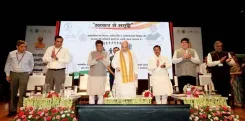Why is the RS Adjourned Till Monday Amid Protests and Legislative Gridlock?

Synopsis
Key Takeaways
- Rajya Sabha faces legislative disruptions for five days.
- Opposition protests focus on electoral integrity in Bihar.
- Adjournment until Monday amid rising tensions.
- Kamal Haasan makes his parliamentary debut.
- Upcoming legislative agenda includes significant bills.
New Delhi, July 25 (NationPress) The Rajya Sabha faced its fifth straight day of legislative deadlock, marked by relentless disruptions during the afternoon session, culminating in a day filled with significant political strain and procedural standstill.
The Chair announced an adjournment until Monday as Opposition parties continued their loud protests regarding the Special Intensive Revision (SIR) of Bihar’s electoral rolls.
With critical Assembly elections approaching in the state later this year, the Opposition has voiced serious concerns about alleged irregularities and lack of transparency related to the revision process, insisting on a comprehensive debate under Rule 267.
Despite multiple appeals from the Chair and Union ministers for decorum and constructive discussion, the House remains engulfed in disruption, illustrating rising tensions over electoral integrity and institutional responsibility.
Earlier, Deputy Chairman Harivansh had adjourned the House until noon after dismissing nearly 28 Opposition notices under Rule 267, which called for the suspension of regular business to address issues from the SIR in Bihar to constitutional concerns in Manipur and the repercussions of India-UK trade negotiations on the Indian economy.
When the House reconvened at noon, Ghanshyam Tiwari took the floor during Question Hour, directing a query to BJP MP K. Lakshman (Uttar Pradesh) regarding a specific campaign initiative. However, the session quickly descended into turmoil as Opposition members shouted slogans, drowning out Agriculture Minister Shivraj Singh Chouhan’s efforts to speak.
Chouhan repeatedly called for order, emphasizing the significance of legislative work, but the disruptions only intensified.
Foreseeing further chaos, the Chair adjourned the House until Monday.
Earlier in the day, Zero Hour also exhibited similar scenes. Despite Deputy Chairman Harivansh’s attempts to encourage urgent interventions, members such as Ajit Bhual, Rajiv Shukla, Ranjeet Ranjan, Trichi Siva, Santosh Kumar P., and Ramji Lal Suman were denied speaking time, leading to loud protests.
The Chair invoked Rule 235, which prohibits the display of placards and interruptions, before adjourning the House.
Actor-politician Kamal Haasan, the founder of Makkal Needhi Maiam (MNM), made his parliamentary debut, taking an oath in Tamil as a Member of the Rajya Sabha.
Supported by the DMK-led coalition, Haasan was elected unopposed and vowed to uphold constitutional values. He was joined by fellow DMK members Rajathi, S.R. Sivalingam, and P. Wilson.
Meanwhile, routine business proceeded. Commerce Minister Jitendra Prasad presented grant demands and a report on India’s trade collaboration with Gulf countries.
Members Ram Nath Thakur, Bhagirath Choudhary, Kiran Choudhary, and Shaktisinh Gohil submitted committee reports.
Minister of State for Parliamentary Affairs Dr. L. Murugan outlined the legislative agenda for next week, which includes the Goa Bill 2024, the Merchant Shipping Bill, and two key sports-related legislations: the National Sports Governance Bill and the National Anti-Doping Bill 2025.
Notably, the sports governance bill proposes establishing a Sports Regulatory Board and mandates ethical standards, athlete representation, and mechanisms for dispute resolution.
As the Opposition remains resolute in pressing its demands and the government stands firm on procedural adherence, the Rajya Sabha faces a deepening standoff over electoral integrity, environmental accountability, and institutional transparency.







